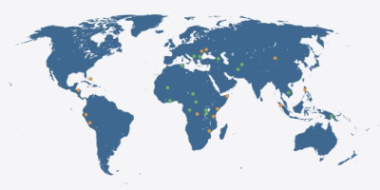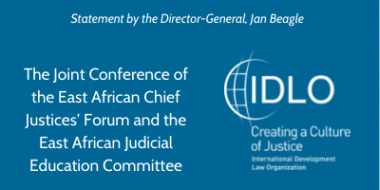Building Judicial Capacity

Efficient, equitable and accessible justice systems are the lifeblood of the rule of law. For many years, building judicial capacity in the developing world was IDLO's sole area of intervention.
Today, while our mission and expertise has greatly expanded, we remain faithful to that early purpose. Building capacity in the judiciary is still the bulk of what we do, and what we are most recognized for. We do this in a variety of legal systems and traditions, working with local and international partners, with a strong emphasis on transition societies.
In the words of Kyrgyz Supreme Court Chair and IDLO interlocutor Feruza Z. Djumasheva, "Without successful judicial reforms, there will be no economic or social reform."
SIGAR's letter to Secretary John Kerry: Incorrect
The letter that was sent by the Office of the Special Inspector General for Afghanistan Reconstruction (SIGAR) to U.S. Secretary of State, John Kerry, with relation to the International Development Law Organization (IDLO), contains a number of factual errors and speculative assertions based on incorrect or incomplete information.
IDLO: Changing the Face of Justice in Afghanistan
IDLO has over 30 years of experience in providing legal training for more than 25,000 people in the developing world, and has been working in Afghanistan since 2002. As an inter-governmental organisation, Afghanistan is also a member state of IDLO and this relationship further strengthens our engagement and effectiveness with local authorities and partners.

US Stands by IDLO in Afghan Contract Row
The US State Department has strongly defended IDLO’s record in Afghanistan. The comments came in response to allegations by the monitoring agency, SIGAR, that more than $47 million in funds allocated to IDLO for judicial training in Afghanistan lacked proper oversight.

Afghanistan: Stemming the Flow of Cash, Smoothing the Course of Justice
One of the most vital components of IDLO’s judicial training program in Afghanistan is well underway, with dozens of legal professionals -- 12 percent of them female – receiving intensive training in the fight against money-laundering. Attendees include judges, prosecutors, defense attorneys and Criminal Investigation Department officers.

Assisting Yemen’s Steps Toward Successful Nationhood
Following on from its engagement with Afghanistan, and its more recent one with Somalia and South Sudan, IDLO is stepping up its commitment to fragile states by providing assistance to Yemen. The nation, which has only recently emerged from authoritarian rule, has embarked on a reform experiment known as the National Dialogue Conference.

Afghanistan's Justice Training Transition Program (JTTP)
Launched in March 2013 in partnership with the Afghan government, the Justice Training Transition Program (JTTP) offers justice professionals unprecedented levels of training in core legal skills and competencies. It provides continuing education courses on Afghan law to provincial courts, the Ministry of Justice and other government bodies. By far our most ambitious program anywhere, JTTP also provides criminal justice training and mentoring for Afghan prosecutors, judges, defense attorneys and investigators.
Pages
Key Initiatives
-
 Lack of good governance and the rule of law are one of the most pressing problems confronting modern Somalia on its path towards stability and reconstruction. While there have been signs of progress, the absence of robust and competent institutions has contributed to a climate of insecurity and impunity. Several assessments of the justice system in Somalia have found that judges and prosecutors lack of adequate skills to effectively administer criminal trials in line with Somali laws and procedures, particularly with respect to safeguarding the rights of the accused.
Lack of good governance and the rule of law are one of the most pressing problems confronting modern Somalia on its path towards stability and reconstruction. While there have been signs of progress, the absence of robust and competent institutions has contributed to a climate of insecurity and impunity. Several assessments of the justice system in Somalia have found that judges and prosecutors lack of adequate skills to effectively administer criminal trials in line with Somali laws and procedures, particularly with respect to safeguarding the rights of the accused. -
 Despite reform efforts undertaken by the Government of Ukraine after the Maidan Revolution in 2014, Ukrainian citizens continue to regard criminal justice stakeholders with deep distrust. In 2019, the presidential and snap parliamentary elections resulted in a shift of the political environment, creating an opportunity to meaningfully advance anti-corruption reforms.
Despite reform efforts undertaken by the Government of Ukraine after the Maidan Revolution in 2014, Ukrainian citizens continue to regard criminal justice stakeholders with deep distrust. In 2019, the presidential and snap parliamentary elections resulted in a shift of the political environment, creating an opportunity to meaningfully advance anti-corruption reforms. -
 Strengthening the capacity of prosecutors, judges and lawyers in Rwanda in international criminal law is both important and timely. Over two decades after Rwanda’s genocide, the number of cases extradited and transferred from other countries to Rwanda continues to increase. Given that international criminal law is a complex and evolving field, prosecutors who appear in Transfer cases would benefit from skills allowing them to more accurately and effectively research and apply the latest judicial precedents.
Strengthening the capacity of prosecutors, judges and lawyers in Rwanda in international criminal law is both important and timely. Over two decades after Rwanda’s genocide, the number of cases extradited and transferred from other countries to Rwanda continues to increase. Given that international criminal law is a complex and evolving field, prosecutors who appear in Transfer cases would benefit from skills allowing them to more accurately and effectively research and apply the latest judicial precedents. -
 In Indonesia, with its civil law system, many scholars believe that lecturers do not have any obligation to use case law or jurisprudence, including among judges. This causes stagnant development of the law both in practice and theory. Therefore, integrating case law into education will not only be beneficial to both student and lecturer, but also for the judges so they can employ better consideration when making their decisions or verdicts.
In Indonesia, with its civil law system, many scholars believe that lecturers do not have any obligation to use case law or jurisprudence, including among judges. This causes stagnant development of the law both in practice and theory. Therefore, integrating case law into education will not only be beneficial to both student and lecturer, but also for the judges so they can employ better consideration when making their decisions or verdicts. -
 Until recently, court processes in the Kyrgyz Republic have not been automated. Manual or paper systems still are required and are the norm although automating all processes has started very actively. According the country’s National Target Program for Development of the Judiciary, automated information systems need to be expanded and rolled out to the whole judicial system, not only within all first instance courts, but also second and third instance courts.
Until recently, court processes in the Kyrgyz Republic have not been automated. Manual or paper systems still are required and are the norm although automating all processes has started very actively. According the country’s National Target Program for Development of the Judiciary, automated information systems need to be expanded and rolled out to the whole judicial system, not only within all first instance courts, but also second and third instance courts.
Latest Activity
|
Policy Statements
|




